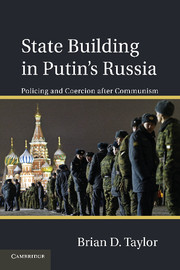Book contents
- Frontmatter
- Contents
- List of Figures, Tables, and Maps
- List of Abbreviations
- Acknowledgments
- Note on Transliteration and Translation
- Introduction
- 1 Bringing the Gun Back In
- 2 The Power Ministries and the Siloviki
- 3 Coercion and Capacity
- 4 Coercion and Capacity
- 5 Coercion and Quality
- 6 Coercion and Quality
- 7 Coercion in the North Caucasus
- 8 State Capacity and Quality Reconsidered
- Appendix A Publication Abbreviations
- Appendix B Interview Index
- References
- Index
2 - The Power Ministries and the Siloviki
Published online by Cambridge University Press: 04 February 2011
- Frontmatter
- Contents
- List of Figures, Tables, and Maps
- List of Abbreviations
- Acknowledgments
- Note on Transliteration and Translation
- Introduction
- 1 Bringing the Gun Back In
- 2 The Power Ministries and the Siloviki
- 3 Coercion and Capacity
- 4 Coercion and Capacity
- 5 Coercion and Quality
- 6 Coercion and Quality
- 7 Coercion in the North Caucasus
- 8 State Capacity and Quality Reconsidered
- Appendix A Publication Abbreviations
- Appendix B Interview Index
- References
- Index
Summary
The group of FSB personnel assigned to work undercover in the government has successfully carried out the first step of their assignment.
Vladimir Putin, December 1999History has arranged it that the burden of upholding Russian statehood has to a considerable extent fallen on our shoulders.
Viktor Cherkesov, KGB veteran and Putin ally, December 2004Putin presumably was joking when he made the statement quoted in the epigraph at a reception for secret police personnel on December 20, 1999, less than two weeks before he would become acting president when Boris Yeltsin surprisingly resigned on New Year's Eve 1999. But, as Russians like to say, in every joke there is an element of truth. And if Putin was joking, his close friend Cherkesov was deadly serious, arguing that Russia itself would perish if secret police alumni could not unify their forces.
During Putin's tenure as president, he relied heavily on officials who had made their careers in law enforcement and military agencies. State coercive bodies, referred to in Russia as the power ministries (silovye ministerstva) or power structures (silovye struktury), rose in stature. Russian citizens, for example, believed that Putin represented the interests of the power ministries – more than big business (“the oligarchs”), “ordinary people,” the state bureaucracy, or society as a whole. The increased prominence of personnel from these agencies throughout government led the Russian sociologist Olga Kryshtanovskaya to dub Putin's regime a “militocracy.”
- Type
- Chapter
- Information
- State Building in Putin’s RussiaPolicing and Coercion after Communism, pp. 36 - 70Publisher: Cambridge University PressPrint publication year: 2011



